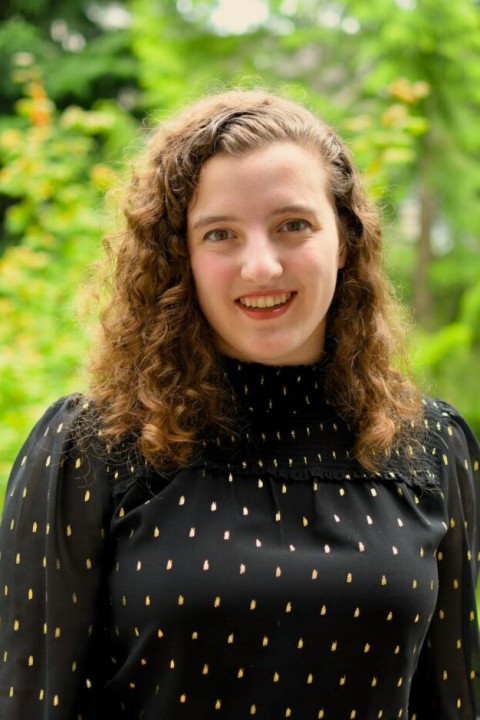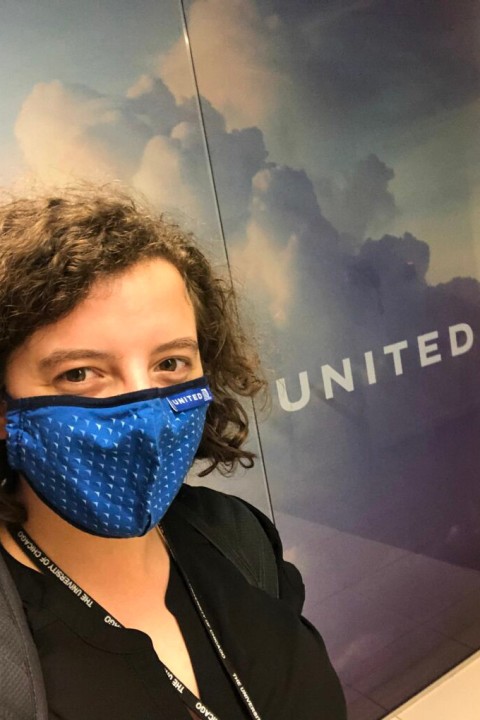For computer science and Classics major Gabi Garcia, dual-identity has never been something to shy away from. Whether that means embracing the vastly different fields of study she chose or seizing opportunities that stem from her Latin American roots, Garcia has forged a unique path that includes interning at United Airlines and working with European ancient text experts.
Garcia benefitted from the Hispanic Information Technology Executive Council (HITEC) scholarship, which is designed to assist students of Hispanic descent in obtaining a university degree in technology. The application is open now for those wishing to apply.
We sat down with Garcia to discuss the scholarship that has been funding her different academic pursuits, how it has shaped her career, and her experience navigating the male-dominated industry of technology.

You are now a fourth-year student at UChicago and have received this HITEC scholarship for each year you’ve been here. Tell me about the scholarship.
Someone posted about this scholarship for Hispanic students in tech in a Facebook group I joined after receiving a state award and national honorable mention for NCWIT’s Aspirations in Computing award that connected me with other winners. The scholarship awards you $5,000, which isn’t nothing, and they take all sorts of technical majors. So when I thought I was going to be a statistics major, I was eligible. When I switched to computer science, I was even more eligible. I just figured, ‘why not?’ My dad’s family is from Argentina, so I’m Hispanic despite not looking like it.
What kind of opportunities did it bring for you?
We were each paired with a mentor on the Hispanic Information Technology Executive Council, and they were all pretty high up at tech companies. I was paired with Sylvia Gomez, who is a managing director in IT field services at United Airlines.
How does that mentorship work?
I meet with Sylvia about once a month. We talk about how classes are going, what I see myself doing in the future, and our backgrounds, but then we also talk about how to advocate for yourself. Especially for someone who isn’t a man in tech, it can be so difficult to navigate technical spaces.
What is it like being a Hispanic woman in tech?
For instance, in a lot of the classes that have any sort of reputation for being difficult, there are 10 or fewer women out of about 60 people in the class. That can be really tough to deal with. It makes it more difficult to make friends or feel respected. You have to be really thick-skinned about it. One of the questions on the scholarship application is, ‘what does being Hispanic in tech mean to you,’ and Sylvia and I have talked about how pretty much every female applicant says that being a woman sets them apart more than being Hispanic.
How do you deal with that?
Regardless of how good you are at something, if you walk into a room and people talk around you like you don’t belong there, it can worm its way into your head and make you feel that way – even if that’s not the case. So I’ve just been trying to make sure that I tell myself, you know, I am good at this. I don’t need to attribute my worth to the things that I do, but it’s nice to know that there is something that I can do and I am capable of. I try to make sure that I am speaking at least as much as all the men in a room and I am very clear that I will not be interrupted. Just being kind of a stickler about that sort of thing has helped. I mean, even in non-technical spaces. Classics is also a pretty male-dominated field.
Right, you also specialize in digital classics. How have you managed to make computer science work within the realm of humanities?
I had taken a class on databases here last winter with Aaron Elmore, and just absolutely loved it. I was always really interested in the weird ways we classify ancient texts, so I was put in touch with Professor Sofía Torallas Tovar who gave me the three main projects in papyrology that were very computer science heavy. I selected the Trismegistos database, which is a metadata database of ancient texts held at KU Leuven in Belgium.
So the problem that was posed to me by Mark Depauw, my advisor at Leuven, is that they have all these sub-databases for references to things like people or places, but a database for gods is something that doesn’t currently exist in full form in any place in the field. It’s a really philosophically complex problem when you’re dealing with Rome, Greece, and Egypt, because unlike people, the lines between gods can be really fuzzy. If you’re not a computer scientist, it can be very difficult to think about how you handle this data, where you draw the lines, and how you do it without angering a very old and traditional field.

How did your computer science background help you come up with a solution?
Trismegistos is actually a relational database; pretty industry standard in computer science and very uncommon in the humanities, which allowed me to come at my thesis project like a software development project. That’s maybe something that the classics department didn’t expect, but has been incredibly fruitful. In the humanities, there are many people who are like, ‘I would rather just have my pile of books, handwrite everything, maybe type things on my computer, but I don’t want to be doing anything super digital.’ Trying to make something that will appeal to these people who are so decidedly non technical means knowing how to make a database that is complex enough to handle the ambiguity present in ancient religion, but at the same time, simple enough that anyone can use it.
You’ll be starting full-time at United Airlines in the fall, but you have already spent two summers working there as an intern, correct?
Yeah, so I ended up landing my first summer internship in tech, between second and third year, at United because of Sylvia. I decided to work on the mobile app because I had a background in Swift and had done a little bit of mobile app programming in Java for Android in high school. I had just started the CS intro sequence my second year, so I had only taken CS 161 and 162 during winter quarter and CS 220 and another elective in the spring. Even though I had a pretty decent background in programming, I still didn’t feel like I understood computer science all that well. I wound up not only contributing bug fixes about three weeks into the internship to the main codebase of the app that went out in an update that summer, but also helped implement some UI design that ended up in the app in the fall as well.
The whole thing showed me that what I’ve learned here can be very applicable. It was a little weird learning all these concepts about how things work in the industry: how to use GitHub properly, how to document your code well, how to write good code, modular design, all of that, and then being able to bring that immediately into my internship. Those skills also benefited me in my second internship, where I worked on an Android application for their new in-airport kiosks. It was really nice to have that kind of backbone and familiarity with the process.
The paths you’ve chosen and this scholarship seems to have really set you up for success.
Yeah. I mean, this scholarship has helped fund my education. I’ve also gotten to meet so many wonderful people, and we stay connected over social media. I’ve gotten a job out of it, which is where I’m going to be for the next few years at least. So it’s been nice to build all these connections; I have Sylvia in my corner who wants me to succeed and become one of the tech leaders of tomorrow. It’s so reassuring. On nights where I am having a really hard time with a problem set or a coding project or something, I know that it will be worth it. I know that I have a future, and I deserve it just as much as anybody else.
–This story was originally published to the UChicago Department of Computer Science website, and has been lightly edited to match the College's editorial style.